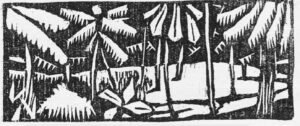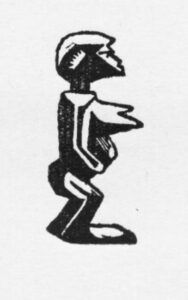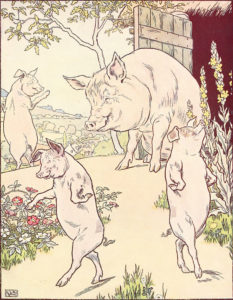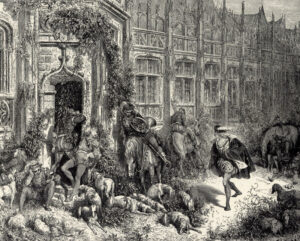
The blue bird
LIRE
Once upon a time, there was a poor man, but poor like Job. His wife was a real shrew, grumpy and grumbling, all crumpled of heart and body, who was called “Ntsheko”, which means smile.
Fortunately, the poor man was often out fishing, otherwise he would have been the most unhappy of men. He was commonly called “Mwan’ a Bahari” or “Bahari”, which means “Son of the Water”.
Now, one morning, when he had left, loaded with his nets, at the edge of the lake, he heard in the reeds a bird singing of a strange kind.
This bird said: Bahari, if you became rich, would you literally lose your mind would you not be drunk?
When Bahari returned home, he said to his wife, “I saw a blue bird at the water’s edge, all blue, and it said to me, ‘Bahari, if you were to become rich, would you not lose your head?”
“I think,” replied the woman, “that you have already lost your mind! You certainly have better things to do than dreaming, by the lake, of bluebirds and other nonsense, while the crocodiles tear your nets and devour your fish. Go incontinently dear me of the silures and the flying fishes that I make richness of it, in ringing deniers!”
“You will always be down to earth, O calamitous woman. I’m off to get you some fish!
And having returned, he heard in the reeds a bird singing of a strange kind. He threw out his nets, but nothing caught. He threw them again, because he was patient, but without more success.
He stood there;
He was there, hesitating to return, of fear of the mauging one, when this one came itself to water.
– Eh dreamer of blue bird, where are you “, she said.
“Come here” he answered, “come and hear the blue bird”.
And the bird repeated: “Bahari, if you became rich, would you not lose your head?
“Can’t you hear it?” said Bahari. But his wife did not hear anything.
He raised his nets;
He raised his nets: empty they were. Large gaping holes, lined with aquatic vegetation, displayed their misery.
At this sight, Ntsheko, in anger, seized a stick and struck her husband across the back, shouting at him: “Go to hell with your blue bird! I do not want to see you under the thatch of our hut anymore. ”
And Bahari, having gone away, fell asleep on the sand, until the moonlight, when he heard the blue bird singing again. He woke up, or at least thought he was waking up.
He saw himself throwing his clothes away;
He saw himself throwing out his nets and answering the bluebird: “Can I lose anything more, after having lost everything? Eh, no, I wouldn’t lose my head! ”
He raised his nets and, strange, admirable thing… he found in the meshes of the device… fish, not, but a perfectly beautiful woman, young and smiling and who seemed to wake up from a long sleep.
Bahari, of surprise not returning, did not dare to draw it on the sand.
She came by herself to sit down near him. At this moment the sun rose, the lake disappeared and its reeds.
A blue bird had flown away. And going up, always going up, it carried with its song Bahari and the woman on the clouds, as in dream, through marvellous countries.
Mosques, palaces, gardens, all filled with flowers and women adorned with fresh tunics, passed before their eyes. He would have liked to stop to taste these treasures: silver lakes filled with fishes… what a fishing!
But the blue bird carried them further, him and the woman, always further, towards new richnesses and new splendours.
Finally, the blue bird went down to land in a field of corn, with the slim and light stems like arrowwoods, with the golden ears like small honey loaves.
The woman who had left Bahari for a moment, came back and took him by the hand to a woman even more beautiful, and who was nothing less than the Queen of Sheba, because of whom Solomon, says the Koran, sinned.
Confounded by so much beauty, Bahari threw himself at her feet and found himself, when the lady lifted him up, dressed in gold, vair and scarlet. A turban of gems girded his head. A long scimitar, with the sheath partitioned of enamels and pearls, with the handle glittering of diamonds, bandaged his waist. He saw himself then, in the mirror that she tended him, more beautiful than he had never been, in his young years.
The great eunuch appeared soon, leading towards the throne of Bahari (because he had sat on the couch which dominated the marble ground of more than ten feet), leading a numerous and richly adorned court.
The corn field had, I forgot, been transformed into a palace whose thousand columns were other than the stalks and the ears of corn the golden cornices. A delicious music seemed to rise from a basin with a thousand singing sources. Women equipped with broad fans of feathers of ostrich, ibis, egret and marabout, assembled on handles of ivory, ebony and gold, created of the movement of wing of their light weapons, a soft and scented breeze.
Their dresses spangled with gold and silver, their bodices of tortoiseshell, mother-of-pearl and gold, glittered under the day of a dome with a thousand lights subdued by a beneficial sun. Naked children, black and white, danced charming rounds.
Young girls from Libya and Egypt were leading, at the end of golden reins, small grey and blue monkeys. Soon, the Queen led him under a baldachin stretched with resplendent fabrics. A mobile bed rolled up to them, soft and perfumed.
Here the Queen gave him a kiss, sweeter than honey, more intoxicating than wine, more perfumed than cinnamon. She rested in the hollow of his chest like a perfumed sachet.
And when they woke up, a Fairy invited them, smiling, to take a bath in a swimming pool, where the clear water let show a mosaic pavement, composed of the forty precious stones of the East, arranged in flowers, in scrolls and other ornaments that the Westerners call ” arabesques “. At the hour of the sunset, the lovers went to walk in the gardens of the palace, marvels of architecture and beauty, where the Art and the Nature, exceeding the richnesses of the gardens of Sémiramis, collaborated to make the stay there divinely pleasant and salutary.
Peacocks with oscillated feathers, ibises with white wings like the soul of a child, crowned cranes, birds of paradise and even these small fledglings which are adorned with all the colors, enchanted this stay of their songs, of their cries.
They arrived thus close to a massif of rock, on which reigned a slender tower with the grilled door. A humble turtle-dove cooed in the hollow of a loophole. A tuft of violet perfumed the threshold of the door, in the shade of a sculpted pillar.
The Queen said to Bahari: “Here I entrust you with the secret of our happiness. This is the Tower of the Blue Bird; I hold the cage where this marvelous little life stirs and sings.
You must never open this cage – never question the bird, never press it to make itself heard, for this cage has a double destiny. It opens the door to good and evil, to happiness and misfortune.
Now that you are my friend, my sweet husband, it is important that you know this secret. Their days flowed, woven with various joys, love and fresh kisses. Wine, songs, birds, flowers, perfumes and women were all Bahari’s life.
But the secret of the blue bird worried him. Sometimes, in the evening, while the Queen was at her toilet, Bahari would prowl around the Tower, anxious, fearful.
His mind was troubled as if by a dream;
His mind was troubled as by a heady wine… He thought he was the master of his own good fortune. He was angry with the blue bird, of the dependence in which he held him. This defense to see him and to open his cage exasperated him.
Why this obstacle in front of a man now so powerful and so rich? Could there be anything that was forbidden to him?
Bahari forgot that he was supposed to be a man of great power and wealth;
Bahari forgot that he owed all his happiness to this bird.
He forgot that he owed all his happiness to this bird;
And, one evening when the Queen had just left him, he forgot everything, and the perfume and the sweetness of the last kiss, he forgot the charm of the white arms of his wife around his collar, the caress of her black eyes staring into his, the sweet song of her word, he forgot the defense.
Quickly, like a malefactor who kills, he stole from the Nubian slave who looked after the bird, the key of the tower and the key of the cage. Distraught, this one had gone to warn the Queen, but it was too late, the impetuous
the impetuous Bahari had opened the Tower and the cage;
Bahari had opened the Tower and the cage. The blue bird, flying away, had taken him in the air.
Bahari flew back to the Tower and the cage;
Bahari passed again on the mosques and the palaces; then having looked at himself, he recognized himself such as he was formerly, dressed in the rags of the old fisherman, dragging his net.
And while he had just touched land, he saw coming to him the grumbling and grumbling, the calamitous Ntsheko, whose name, by irony means Smile .
Tales from Africa / Olivier de Bouveignes
Source: BNF Gallica
FIN
Vous avez repéré une erreur ? N’hésitez pas à nous la signaler en nous écrivant sur cette page
VOUS AVEZ AIMÉ CE CONTE? PARTAGEZ-LE!
AJOUTER AUX FAVORIS
Vous avez aimé ce conte? Ajoutez-le à vos favoris et donnez-lui un like en cliquant le coeur:
CATÉGORIES DU CONTE
Tout savoir sur les Contes de Fées
Avec les clés de lecture
Lisez notre page expliquant l’utilité des Contes de Fées, au niveau intellectuel, émotionnels et des valeurs morales.
Comprendre ce que représente chaque archétype de personnage, bon ou mauvais. L’importance des objets, de la magie, des animaux, etc.
Ajoutez votre version, votre audio ou vos images
Ou publiez votre propre conte
Envoyez-nous votre conte original, votre version ou complétez un conte avec vos illustrations ou un enregistrement audio.

Abonnez-vous à partir de 0,99€ (Promo)
Offre de lancement: Gratuit pour les professeurs
Écoutez les lectures audios en entier
Ajouter des bruitages et musiques de fonds
Créer des nouveaux contes en un instant avec l’IA créateur de conte
Enregistrer vos histoires via l'enregistreur vocal
Garder vos contes favoris et gérer votre liste
Accédez aux excercices de français en grammaire, compréhension, rédaction et débats
Télécharger les contes en PDF
Traduire les mots en anglais et améliorer votre français
Le conteur du futur
Découvrez le Créateur de Contes pour Enfants
Décuplez votre capacité de création d’histoire avec la fée IA mise au service des contes. Vous donnez les idées et il crée pour vous.
D’AUTRES CONTES QUI POURRAIENT VOUS PLAIRE:
LE DICTACONTE (BETA)
Instructions
2) Réduisez l’enregistreur pour lire le conte en recliquant sur l’icône en bas de l’écran.
3) Éditez et sauvegardez en recliquant sur en bas.
Enregistrez-vous!
Enregistrez vos lectures de contes pour les réécouter plus tard, consulter votre liste de contes et les partager à vos proches.

Cliquez pour activer l'enregistreur audio.
IMPORTANT: Vous devrez accepter l'accès au microphone
Activer le dictaconteVous devez être abonné(e) et connécté(e) pour pouvoir sauvegarder.
Connectez-vous – Abonnez-vous ou tester simplement
ABONNEZ-VOUS







































